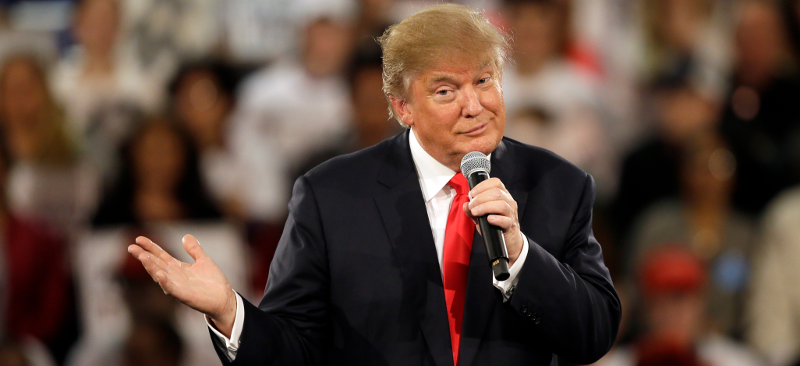Hello, I'm Will Jordan and welcome to The Pulse.
The Pulse is a weekly newsletter YouGov is launching ahead of the 2016 primaries and general election to give readers a one-stop-shop for the latest polling-related news from the campaign.
In addition to YouGov’s own extensive coverage of the election, The Pulse aims to provide you everything you need to know about the horse race, the candidate’s images and the issues resonating with voters.
First, a look at the national horse race:
Trump continues to lead. The latest YouGov/Economist Poll was conducted before Trump announced his controversial proposal to temporarily ban Muslims entering the United States, but there is good reason to doubt it will weaken him (see below). A NYT/CBS poll also conducted mostly before his remarks found a 13 point increase in Trump’s support from last month, the pollsters’ highest Trump number yet.
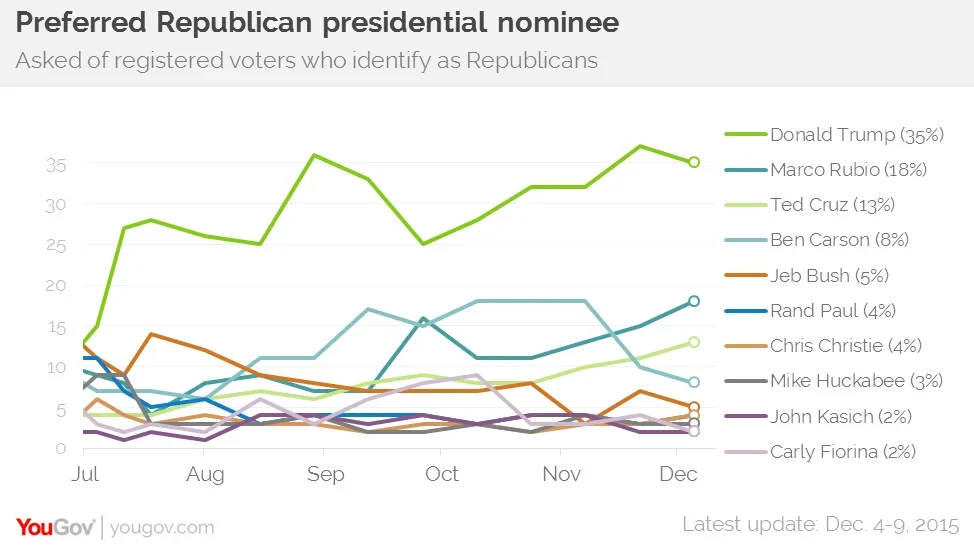
Meanwhile the Democratic race has changed little on the national stage since Joe Biden opted to stay out.
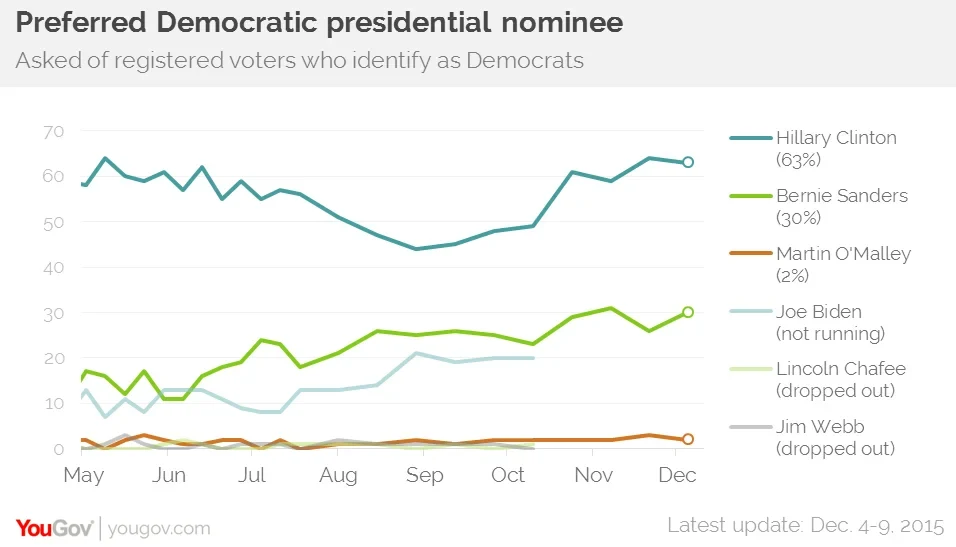
Interestingly, Clinton’s lead is 12 points smaller among registered who have participated in past primaries, but even then she’s 21 points ahead of Sanders.
Invincible Trump?
Leaders from both parties, including those also running for the GOP nomination, have disavowed his proposal for a temporary ban on Muslim immigration. So has Trump finally 'gone too far'? It's too soon to say definitively, but it doesn't seem likely. The Reuters/Ipsos (online) tracking poll is the only national poll to have been conducted totally after the remarks, and it found essentially no change.
More informative is probably the polls on the policy itself, and they tend to show most Republicans are receptive. Of five polls conducted on the policy, four show a majority of Republicans supporting a temporary ban on Muslims entering the United States. (Americans overall, however, are shown either to be divided or opposed). YouGov’s poll finds 45% of Americans in agreement with Trump’s proposal, 41% in disagreement. Republicans back it by 69-25.
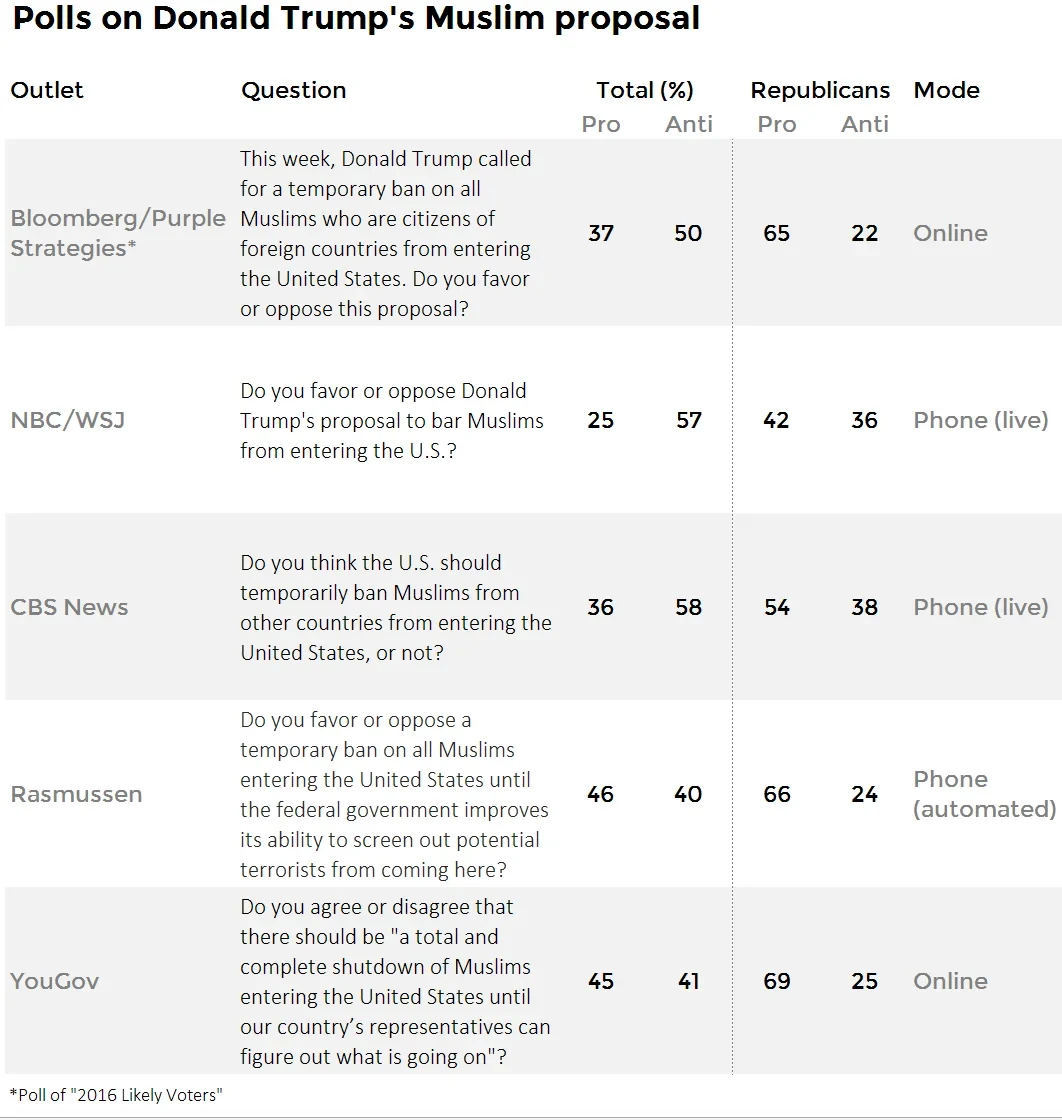
It’s not obvious what explains the major differences between the polls.
One theory: how the respondents are reached. The online polls show significantly less opposition than the polls conducted over the phone. What we may be seeing is a form of “the Bradley Effect”, named for Tom Bradley, a black candidate for governor of California in 1982 who significantly underperformed pre-election polls, because – the theory goes – some white respondents did not want to tell pollsters they were not voting for the black candidate.
Similarly, it’s possible respondents don’t want to seem anti-Muslim when speaking to a real-life interviewer, and say they oppose Trump’s ban, but respond differently in the comfortable anonymity of an online poll. A recent Pew Research study investigating modal effects found that respondents were significantly less likely to acknowledge discrimination against minority groups when asked about it online. And the one phone pollster to find results similar to the online polls (Rasmussen) is conducted by automated calls with digitally-recorded questions.
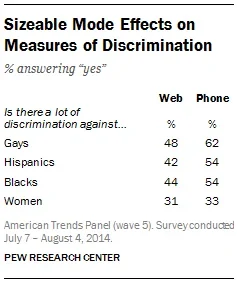
Another possibility is that it comes down to question wording. YouGov, Rasmussen and CBS did not mention Trump by name, while the others did. In addition, whereas YouGov, Rasmussen, Bloomberg and CBS suggested the policy was temporary or conditional, this was not clear from the NBC/WSJ question. Finally, YouGov and Rasmussen gave some sense of the rationale for the policy – Rasmussen even described a goal of “screening out terrorists”. Others simply described the policy.
Terror Trumps the Economy
Part of what seems to be driving Trump's continued strength is a renewed national focus on terrorism. Amidst an improving economy, terrorism is now narrowly seen as the top ‘most important issue’ among Americans (along with Social Security), putting it ahead of the economy for the first time since Barack Obama took office.
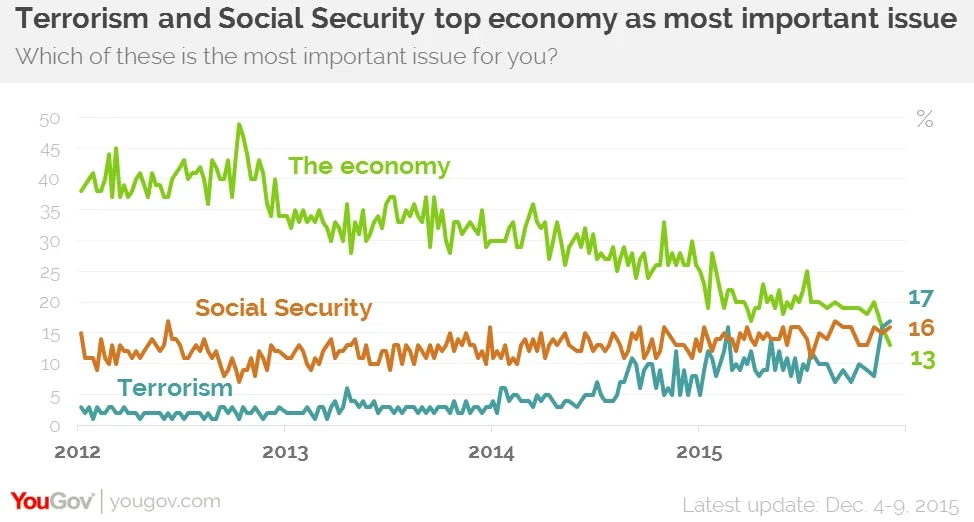
More to the point: the NYT/CBS poll out this week finds that Americans are more concerned about a terrorist attack than any time since post-9/11.
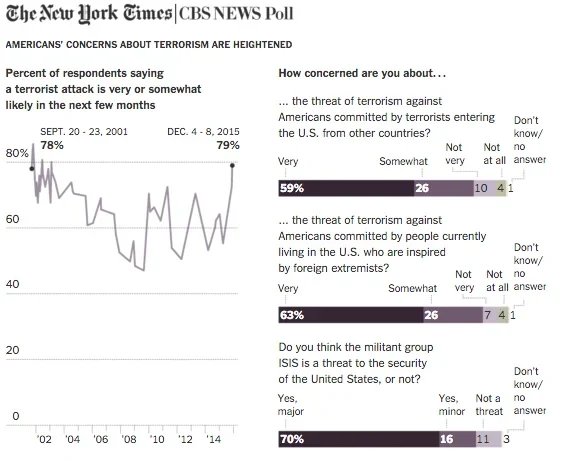
YouGov’s trend only goes back to 2009, but it also found an all-time high (44%) in the numbers who see an imminent attack as "very likely". The question remains how it will affect the race. Harry Enten at FiveThirtyEight argues the GOP is poised to benefit if they continue to be seen as the better party on the issue.
Interestingly, the “Republican Party” edge on terrorism goes against assessments of individual candidates (showing NET ratings):
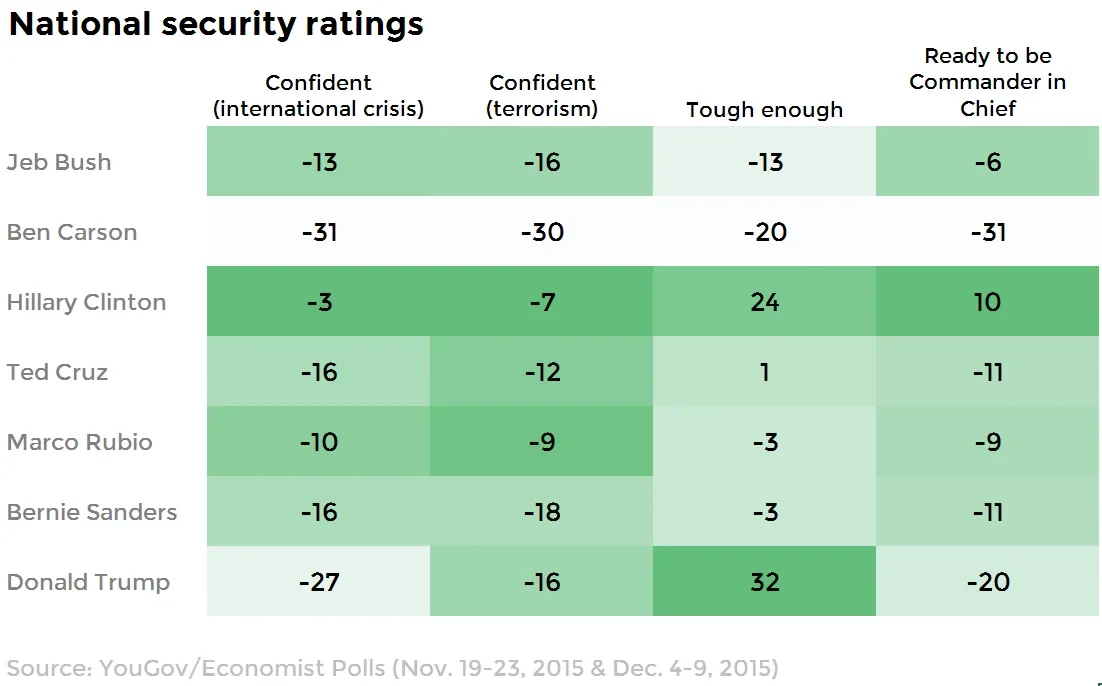
By almost every measure – toughness, readiness, wisdom in dealing with terrorism – the ex-Secretary of State is rated most highly by Americans. Some of this is down to name recognition, and advantages with partisans, and Clinton remains underwater on both favorability and trust. But it may be more difficult to paint Clinton as weak on national security than your average Democrat.
Is Marco Rubio Cruzin' for a bruisin'?
There’s an interesting element to the national security focus within the Republican Party. The NYT/CBS poll found 40% of Republicans “very confident” in Donald Trump’s ability to deal with Terror. The number is 30% for Cruz and – what surprises me somewhat – 20% for Rubio. Here are the ratings cited above, but showing only Republican opinions.
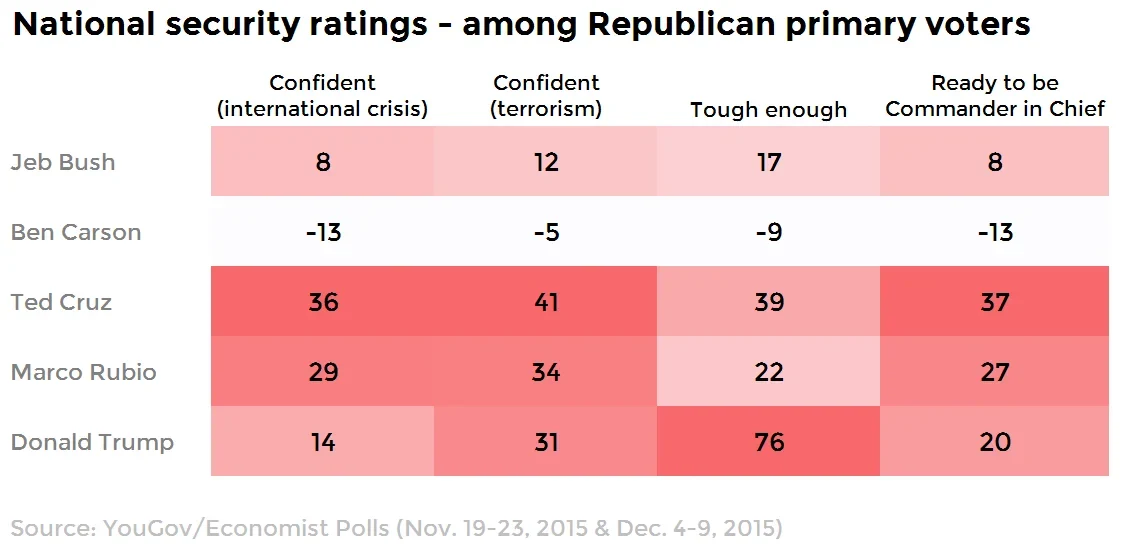
As a senator Rubio has worked hard to develop as a reputation as a leader of the party’s more hawkish wing, and his campaign spent the week attacking Cruz on national security for his position on NSA spying. Voters don't seem to have caught on yet.
Cruz also shows more strength among voters who now prefer Carson or Trump. YouGov asked Carson and Trump supporters to consider who they would back if the race’s two big outsider candidates dropped out, this is what happens:
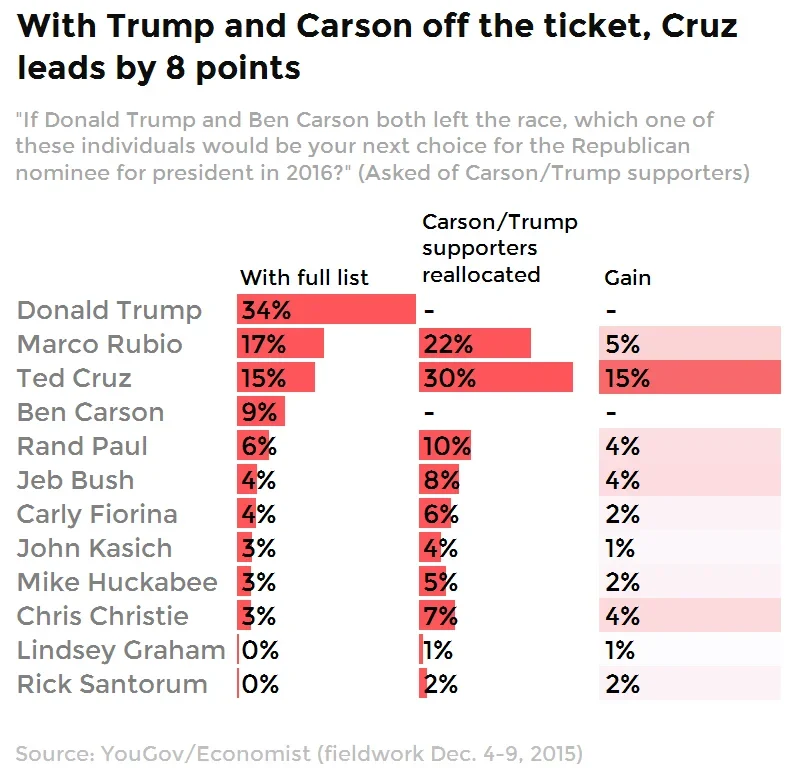
And Cruz leads Rubio 54-46 among Republicans in a hypothetical head-to-head.
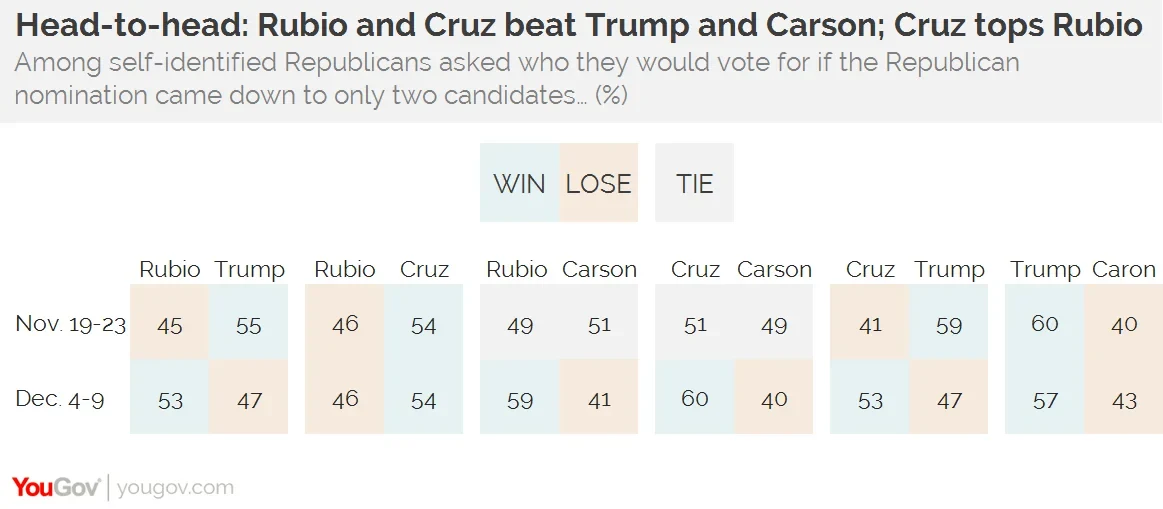
All of this will be subtext to the final Republican debate of the year, scheduled for Tuesday.
Nate Cohn at The Upshot raised the possibility that Rubio looks “un-presidentially boyish”, and I think there is something to this. Later this week YouGov will publish a poll taking a closer look at the candidates’ age – look out!
Follow Will Jordan on Twitter.
